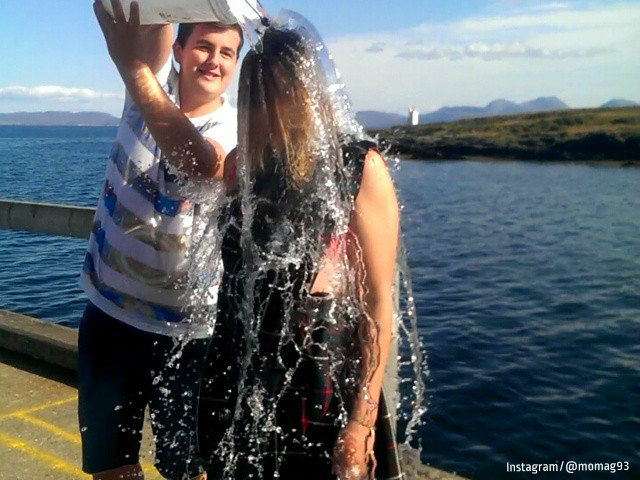Unless you have been living in a cave for the past month, the chances are you will have come across the ice bucket challenge, where people film themselves being drenched in freezing cold water to raise awareness of motor neurone disease.
Participants post their videos on social media sites, then nominate three people to follow their soggy example and match their charitable donations, or else pay ten times the amount. Boos, hisses and ostracism await those who refuse to do either.
Uninviting though it sounds, the ice bucket challenge has become a global sensation, thanks in part to its popularity among celebrities. Now everyone is at it: your friends, your family, your workmates, and all those other people you used to respect. It’s surely only a matter of time before Islamic State jihadists use the challenge as a lighthearted prelude to their beheading videos.
It’s worth remembering amid all this hypothermic tomfoolery that it is still possible to donate to good causes without enduring the discomfort and humiliation of a public dousing. Except that the dousing and the nominating are what has popularised this craze and has kept money flowing into the coffers of the chosen charities.
Not that the popularity of this sadistic chain letter has much to do with a passionate concern for motor neurone disease. In fact, more than half of Brits polled have said they did not make a donation after completing the challenge.
Among the rest, there’s confusion over who deserves their cash, with the Macmillan Cancer Trust hijacking the campaign at the expense of the Motor Neurone Disease Association. Some people have even started nominating their own charities, which rather undermines the idea of the challenge being about raising awareness of a specific medical condition.
For most, the ice bucket challenge is just a voguish ritual that offers the thrill of a shared experience and an opportunity for a little moral preening, in exchange for much less effort than the drama of the stunt suggests. Participants get to feel like they’re part of a caring, daring in-crowd, and get to brag about what a good person this makes them. The cause itself is largely irrelevant and interchangeable with any other. Kids, cats, cancer, whatever. Just hit record and pass the bucket.
The charities benefiting from this idiocy probably couldn’t care less what motivates the donations, as long as they keep coming. And anyway, who could possibly object to charitable giving? As long as the ice bucket challenge encourages it, isn’t it a good thing? Aren’t those who criticises it or refuse to take part just tight-fisted killjoys?
There might be some truth to this were no limit to the public’s generosity. But, in reality, there is only so much money that any of us will give to good causes each year, meaning the ones we favour should be a matter of personal preference, rather than social pressure.
Motor neurone disease is a terrible condition, and charities that fund its research and support its victims are worthy of support; but there are many other good causes out there, and no one should be railroaded into choosing one ahead of another.
Just as it’s impossible to be generous with other people’s money, so there’s nothing altruistic about strong-arming people into donating to your chosen cause — especially if your commitment to it owes more to fad-following than authentic concern.
As long as giving is a zero-sum game, charities deserving of support will lose out simply because they haven’t earned their own irritating hashtag or celebrity endorsement. Meanwhile, those that hitch themselves to an internet mania will cash in whether they deserve to or not.
Take the likes of Oxfam, Greenpeace and Friends of the Earth, for instance. They might enjoy cuddly reputations, but many conservatives recognise them as left-wing pressure groups, advancing dark agenda behind a virtuous facade.
What happens when one of these outfits appear at the centre of a popular campaign? Would their critics deserve to be hounded and stigmatised for not joining in the fun? Absolutely not, but that doesn’t mean it wouldn’t happen.
Like so many other things in life, charity is too important to fall foul of fashionable thinking. By all means give to the causes that matter to you and to the people you wish to help, just leave fads and peer pressure out of it.

COMMENTS
Please let us know if you're having issues with commenting.